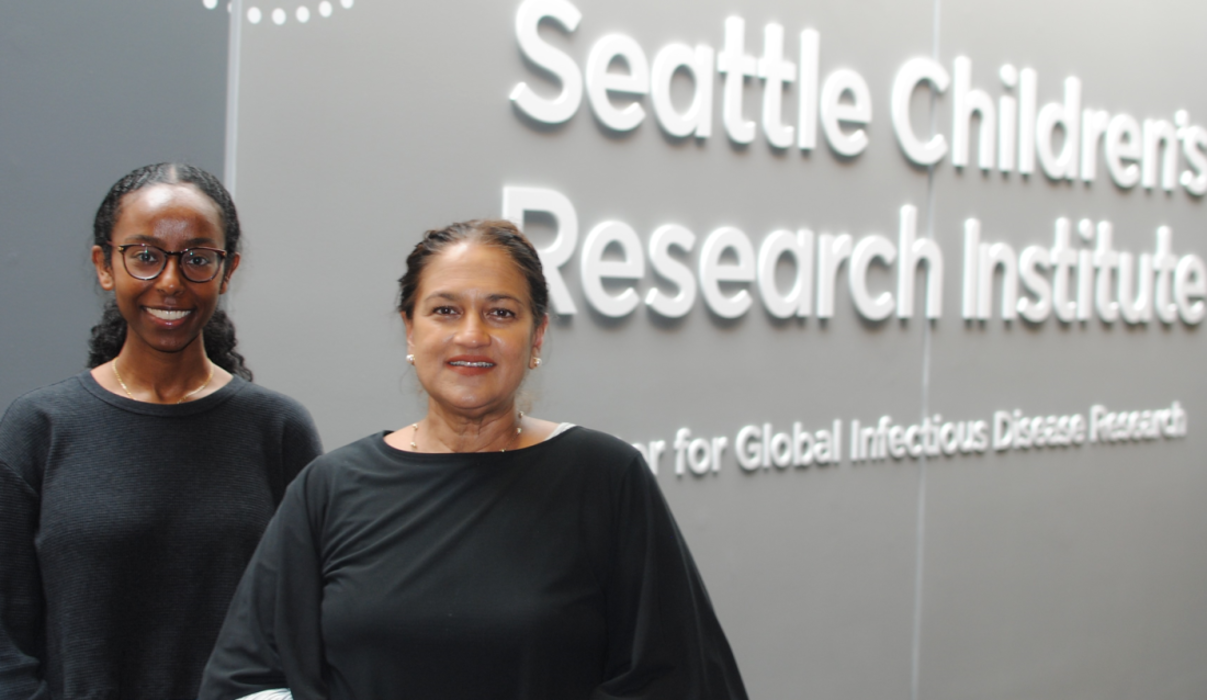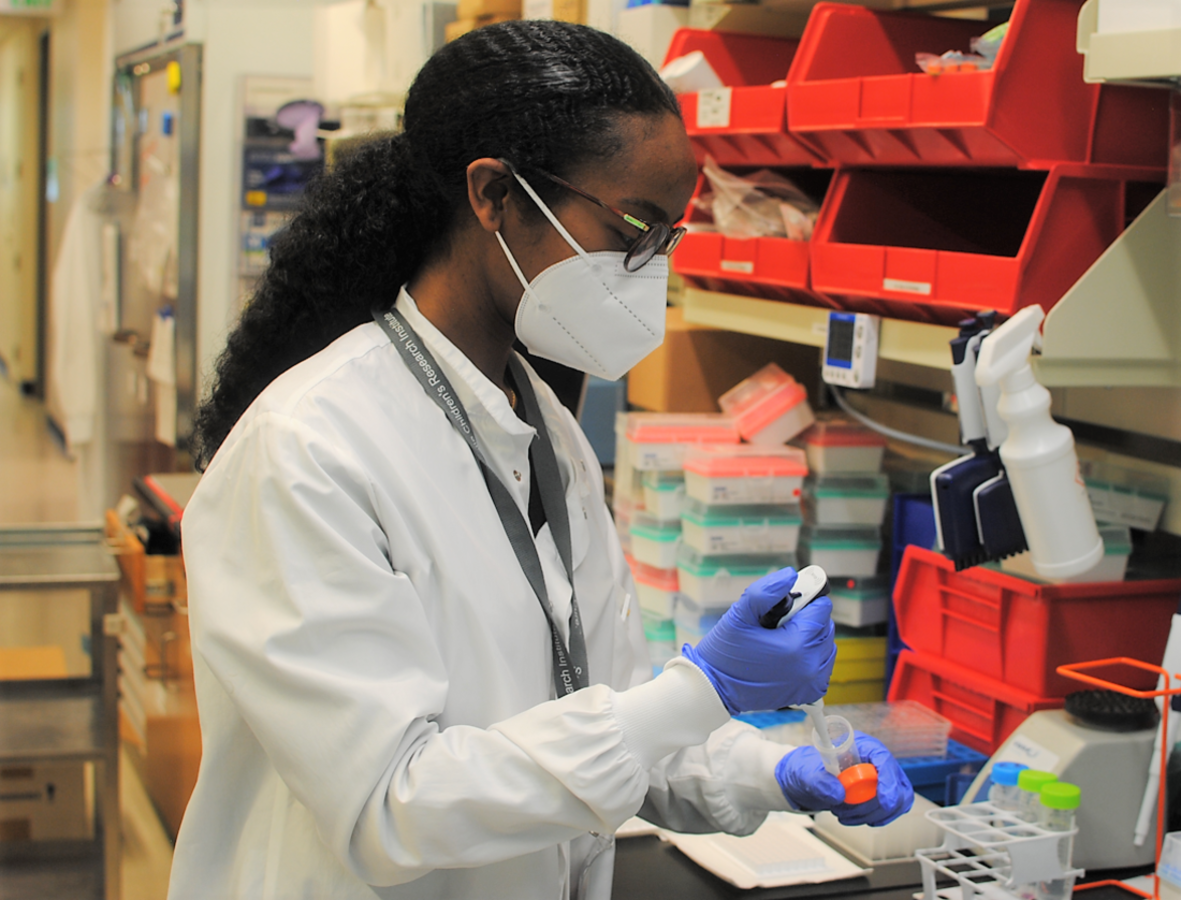
Debora Ferede (L) and Dr. Rhea Coler: “She is eager to learn, is a quick study, and always up for a challenge,” says Dr. Coler.
'Medicine is really tied into advocacy'
It’s become a cliché: “They are wise beyond their years.” Unless you’re referring to Debora Ferede.
Ferede, 22, is the only undergraduate in the lab of BBI’s Dr. Rhea Coler’s at Seattle Children's Research Institute, conducting research as a trainee through the Tuberculosis Research and Training Center funded by the National Institutes of Health. In addition, she already has nearly three years of clinical experience, including her current work as a volunteer health coach at Valley Medical Center in Renton, where she supports patients managing chronic health conditions.
Moreover, she served as the executive officer of the University of Washington’s Minority Association of Pre-Health Students, a “community of underrepresented pre-medical students providing members with knowledge and experiences needed to be socially conscious healthcare professionals.” In 2021, she was a UW Husky 100 recipient. Ferede also is conversational in Amharic, the native language of Ethiopia.
Spend just a few minutes with Ferede and one soon realizes that her “wisdom beyond her years” is grounded in a compassionate commitment to serving others, especially those in underserved communities.
“Medicine is really tied into advocacy,” Ferede said. “A lot of people see this as a glamorous profession, but it’s important to recognize this is all about advocating in my community and other marginalized communities.”
She will take an important step toward that profession in a few weeks when she graduates from the UW with a degree in physiology and a minor in global health. Her immediate plans include continuing to work in the Coler lab, volunteering for community organizations in SeaTac where she lives, and studying for the Medical College Admission Test, with the intention of applying to medical schools for admission in the fall of 2024.
Watching Ferede and Coler interact is a study in mutual admiration and respect. Ferede clearly appreciates Coler’s knowledge as a senior investigator with Seattle Children’s Center for Global Infectious Disease Research, as well as her work as a professor in the UW Medicine Department of Pediatrics and as an adjunct professor in Department of Global Health. Early in her career she worked as a clinician and researcher in Tanzania, Ethiopia, and India, as well as the Caribbean.
In turn, Coler recognizes Ferede’s drive and motivation.
“She is eager to learn, is a quick study, and always up for a challenge,” Coler said. “Her excitement for science and research is evident by the fact that she doesn’t just blindly follow instructions, but rather wants to know what questions we are trying to answer, and why we are conducting specific experiments to answer those questions. This inquisitiveness, curiosity, and attention to detail are why I think she stands out amongst the rest and has a bright future as a researcher.”
 “My identity as a second-generation immigrant pushes me toward success,” says Ferede.
“My identity as a second-generation immigrant pushes me toward success,” says Ferede.
Those remarks must be gratifying to Ferede’s parents who emigrated to the United States from Ethiopia in the 1980s after living briefly in Sudan. They have encouraged their only child to focus on education.
“My identity as a second-generation immigrant pushes me toward success,” she said.
That identity and education have extended far beyond the classroom, according to Lisa Peterson, director of Alliances for Learning and Vision for Underrepresented Americans (ALVA), an NIH-funded UW initiative serving minority incoming freshmen and undergraduates interested in genomics. The program includes academic workshops, undergraduate research, mentoring and advising, travel scholarships, seminars on ethical, legal, and social issues, and building a tight cohort of like-minded students.
It’s no surprise Ferede has participated as both a student and mentor.
“Debora has been proactive in learning, giving back, and leading,” Peterson said. “She is key to why the cohort of 2018 remains so close. I hired her to be a counselor for ALVA. I challenged her to work virtually with the 2021 participants, to create a strong cohort that would last through their UW experience. She was creative, open-minded, and responsive to the students, and created virtual spaces where they wanted to be together.”
As she looks expectantly to medical school in 2024, Ferede remarked that research and clinical work both are interesting and rewarding.
“In research, you use both science and scientific knowledge in solving problems with that knowledge,” she said. “Problem-solving also requires critical thinking, which I enjoy. I would rather challenge myself than finding an easier, more direct answer. I also am inspired by clinical work, because it affords me more contact with people. I can say, ‘Oh, I am making a difference, no matter how small, in this person’s life.’”
The expectation that Ferede will make a difference in many people’s lives is not in doubt.
“Debora’s intelligence, knowledge, science communication skills, and passion for public health work all combine to give her the tools she needs to succeed,” Peterson said. “She has the courage to move forward when things get difficult. When she runs into a wall, she tries her best to figure it out on her own, but if that doesn’t work, rather than give up, she seeks out the support of mentors, friends, and family. She stays connected with her mentors, building a network that gives her a solid base, and at the same time, she is always giving back. Always.”
That “solid base” of knowledge, skills, and passion is also evident in Ferede’s work in the lab, according to Coler.
“With her dedication and hard work, Debora has convinced us that she is serious about pursuing a career as a researcher, wants to be a long-term member of our research team, and that time spent mentoring her and honing her research skills will serve us and the TB science community well,” Coler said. “It’s gratifying to see the ‘next generation’ of scientists who embody the culture of collaboration and investment in the community. All of us at Seattle Children’s and BBI strive to reinforce and support these qualities in young professionals.”


